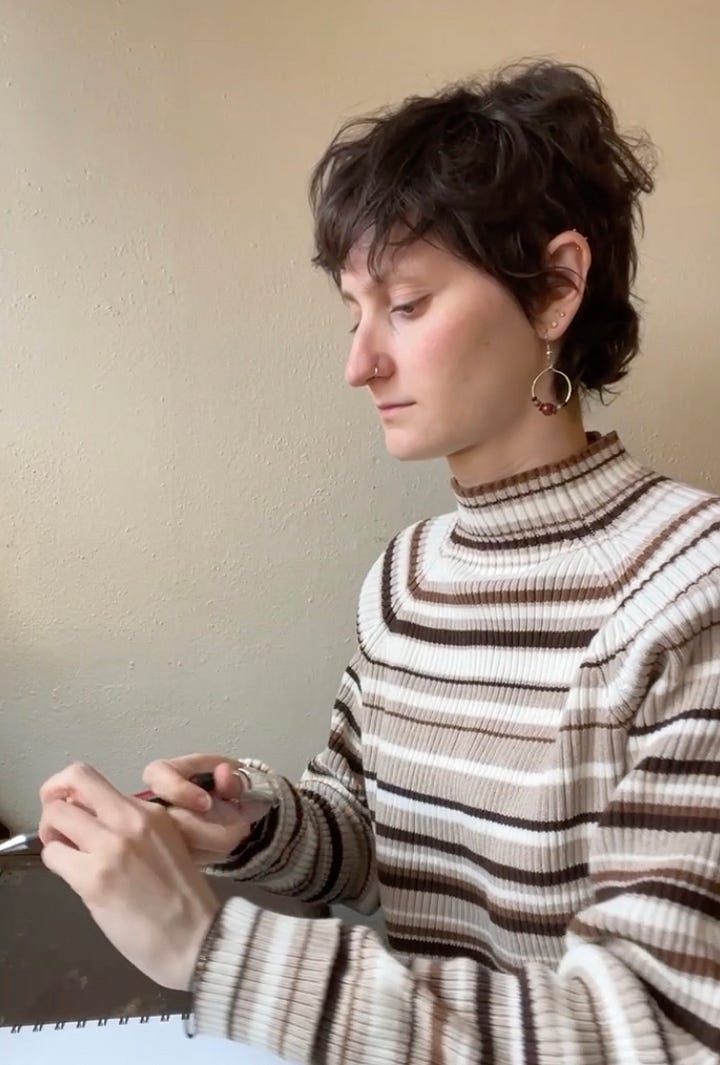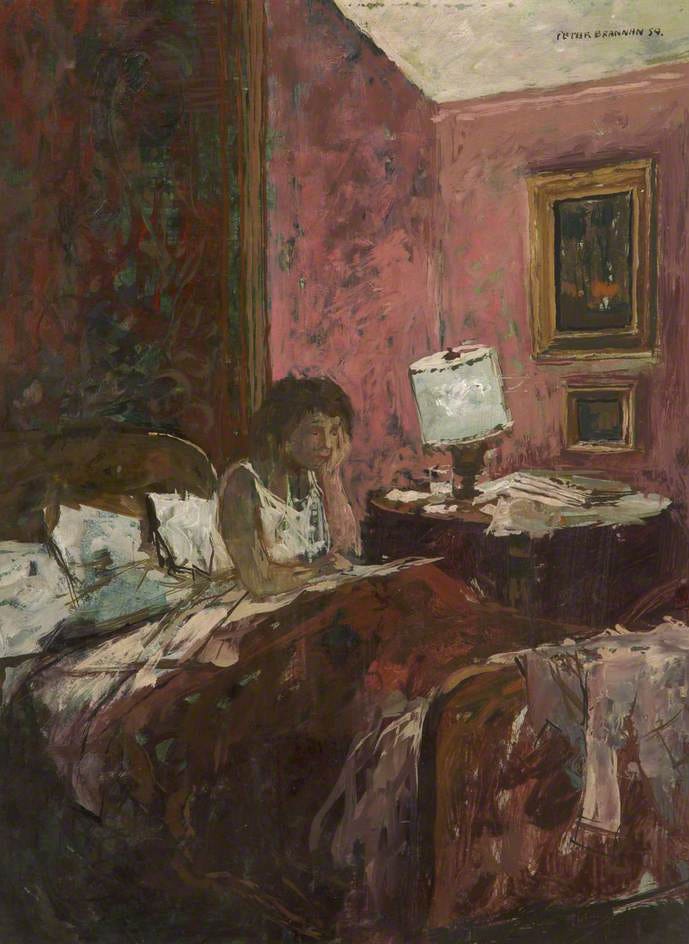A Conversation with Dr. Talia on Creativity, Chronic Illness, and Reclaiming the Self
Conversations Behind the veil 002
In the second edition of Conversations Behind the veil, I sat down with Dr. Talia—psychologist, writer, and creator of Thinking, Chronically, a Substack that has quietly transformed how I think about illness and emotional survival.
We talk about the loneliness of being “unfixable,” the ways chronic illness reshapes identity, and the strange freedom that comes with letting go of resistance. Talia offers a rare blend of clinical wisdom and lived experience, and our conversation feels like a soft place to land.
This series is a space for honest, unguarded dialogue with fellow artists and writers. We explore the unseen: chronic illness, creativity, queerness, neurodivergence, and the quiet work of staying whole in a fractured world.
Content note: This conversation includes discussion of chronic illness, grief, and medical trauma. Please read with care.
vōx: Dr. Talia! I want to thank you for sitting down to talk to me today. I discovered your work earlier this year, and it pulled me in–you feel like a kindred spirit in chronic illness. I’m always trying to show a more nuanced portrait of disability, since I know it can be so easily flattened. You’re definitely doing the same in your writing, letting the experience of chronic illness be as complex as it needs to be.
I was on a path of dissociation and disconnection from my body until my early 30s. I couldn’t bear to be present in the pain and discomfort of my sick body. And because it was my lived experience, I assumed everyone else was also in pain most of the time–and they were just dealing with it fine. So why couldn’t I hack it?
In 2021, my pain reached a level that became debilitating. I spent much of that year bedbound, hiding what was happening from almost everyone. I wasn’t ready to face the fact that I was disabled.
Then in 2023, in an avalanche of new information, I received my autism diagnosis, results from wearing a heart monitor, and the shock that both labrums in my hips were torn. That’s when I started to suspect POTS and hypermobile Ehlers-Danlos. It would be 2 more years before I got a diagnosis.
Those two years were pivotal for my mental health. Left without answers and still being gaslit by the medical system, I finally had to face reality. I began to fully grieve the old versions of myself. I started asking for help where I needed it. I told the internet and my friends the truth of what was going on. I began offering myself peace and grace.
More recently, I’ve started to find love and presence in my sick body. I’ve learned to speak to myself with kindness and accept that I’m not in control.
I’d love to hear about your own journey within your body, your mind, and the medical system. What emotions have you had to grapple with along the way?
Dr. Talia: It was so lovely to hear about your journey to self-acceptance and self-kindness while living in a sick body.
I can relate to living a dissociated life until my mid to late twenties. I learned early on that voicing my physical needs was not acceptable. That I was expected to not experience and not feel what my body was telling me.
And often when we learn (out of necessity) to not listen to the small cues and signs that our body sends us, it leads to a need for greater system disruption. Around age 23 I started having many weird symptoms that were all “unrelated” and no doctor could tell me what was wrong. At 26 I was finally diagnosed with Hypermobile EDS which allowed me to gain access to care and support that I needed. At 29, I went on a meditation retreat that led to the start of a debilitating POTS episode that left me majority bedbound for 9 months. That period forced me to learn and unlearn so much about bodies and shame, and for that, I am very grateful.
The last two years have been painful and isolating in so many ways. I have faced my grief, my shame, my sadness, my fear. It’s been hard. But the last two years have also led me to speak openly about my experience of illness and to provide support for others who are struggling. It feels like my purpose to combine my creativity, clinical psychology expertise, and lived experience of illness to support others.
Yes, I had to face difficult emotions, and I also introduced joy, self-trust, and harmony with my body.


vōx: I can relate so much to how illness clarifies what truly matters. There’s a preciousness to creation in the face of illness. When you only have a finite amount of energy, much less than your peers, the things you choose to put your energy into mean so much more. For me, there’s no more questioning the meaning behind what I do.
In what ways has your creativity changed alongside your body?
Dr. Talia: Creativity has been my saving grace, both mentally and physically. I was a creative kid, but my life experiences dimmed that light, not all at once, but piece by piece, through multiple chronic and acute traumatic experiences. I slowly lost access to my creativity, it was hidden under perfectionism, self-doubt, and fear of being seen. I challenged myself around 4 years ago (this was pre-bedbound episode, but I was dealing with debilitating PTSD and was still managing multiple chronic illnesses) to do something creative for just 10 minutes each day. I gave myself a wide array of options from doodling, to writing music, to dancing. Slowly I started to gain confidence and ownership of my creativity. And it helped me reconnect to myself and to my gifts.
My first creative endeavor around illness was my Instagram. I really enjoy making video content, but was noticing that I craved a space where I could write more deeply, so that’s why I joined Substack! Launching my newsletter was a result of me following my creative intuition, and seeing my writing resonate with so many people is incredibly fulfilling. There’s nothing more powerful than simply starting. Creating while sick has taught me how to tune into my body, how to treat it with compassion, and how to process and release complex emotions like grief that come from living in a disabled body.
How has your relationship to being a musician changed as a result of your more recent health struggles?
vōx: Honestly, my health struggles made me consider leaving the music industry altogether.
Around 2022, I fell into a deep depression and dissociation. I couldn’t do the things I loved anymore. Traveling, doing photoshoots, and performing had become impossible to maintain the way I had before.
I was carrying a lot of body grief. I was at war with my body. I didn’t love it–I resented it. I thought I’d have to quit being an artist and give up on music. I just didn’t see a path forward when it felt like the work was killing me.
My internal ableism was so loud. I was terrified to tell the world the truth–that I was disabled. I was terrified to admit it even to myself. Because of that, I never asked for accommodations that could’ve made parts of my work more manageable.
I know you’ve written about a similar journey of letting go of old goals and reimagining your future. Would you be open to sharing moments where you’ve had to pivot in your career or creative workflow? What are some accommodations you’ve learned to ask for in your life?
Dr. Talia: Your story resonates with me. I know how deeply difficult it is to need to grieve not only your current body, but also the future life you thought you’d live. This is why grief is a major topic in my art and writing.
I was in a PhD program for Clinical Psychology, with the goal of becoming a licensed therapist and a professor/researcher. These paths had long felt like the right fit for my intellectual and intuitive mind. But after a couple of years in the program, it became clear that my body couldn’t keep up with the demands of academia, and of this program in particular. Letting go of those career paths – as a deeply career-driven person – was painful, but ultimately necessary.
I won’t lie. I entered an intense stage of freeze and grief, unable to understand what I would do with my life without the path I had planned to follow. Ultimately, I committed to staying in my program because I was passionate about the research I was doing, and I think that somewhere, somehow I still had trust in myself that I would figure out what was next. That in time, the path would become clear to me.
I learned pretty early on in my PhD that accommodations were an absolute necessity if I wanted to graduate, and I learned how to communicate effectively. I was able to show supervisors and professors that I did quality work, and I always got it done, but that sometimes the path to accomplishment would look different than it did for other students. I asked for extensions, furniture, virtual attendance, flexibility with attendance, and more. Every time I asked for an accommodation it became a bit easier, but at first I would cry almost every time because it was so deeply emotionally exhausting.
We’re all so programmed to not ask for help, likely because we’ve been let down in the past. I’ve come to accept that I won’t always receive the support I need, but if I don’t ask, I definitely won’t receive it. I learned how to work with my nervous system to be able to hold the rejection.
vōx: I really commend you for learning to ask for the accommodations you need. This is so not easy! Learning to ask for help has been a slow process for me too. I still sometimes catch myself worrying about what others are thinking or how I’m being perceived.
This happens every time I’m traveling and need wheelchair assistance. I know many people don’t understand dynamic disabilities1–how you may have use of your legs but not be able to stand for long periods, or how some days you can walk and others you can’t. I see people eye me down for looking young and “capable.” I see them judge me when I get up from a wheelchair and walk. I still feel embarrassed sometimes, because I fear being misunderstood.
But like you said–each time you stand up for your body, your nervous system learns to trust you a little more. Asking for accommodations is like saying to your body: I’ve got you. I’ll protect you. I’ll care for you. That’s a radical act!
Dr. Talia: Asking for help is a radical act! I love that. I am proud of you for facing your fears, and for allowing others to misunderstand you. That takes courage, and it shows how fiercely you are working to live as your authentic self. I’m glad to hear it :)
This has been a lovely conversation.
vōx: Talia, thank you so much for sharing so vulnerably. I feel deeply connected to your creative journey, and I know others will feel the same.
I’d love to end on a hopeful note–what’s been uplifting you lately? Any new projects on the horizon? Anything final thoughts you’d like to share?
Dr. Talia: Thank you for inviting me to collaborate! It means a lot to me, and I appreciate the space you’re creating with your newsletter.
The flowers have been uplifting me lately. The nicer weather. Music. My creativity.
I have also just launched my “Ask Dr. Talia” segment on my newsletter. This bi-monthly segment allows paid subscribers to submit questions related to managing the emotional impacts of illness, and to get personalized responses from me, including relevant resources, reflection prompts, and helpful practices.
My mission is to create a world where individuals managing chronic illness have their emotional needs supported, so I’m really excited about the impact this segment will have on the collective healing of our community! You can read more about the segment and the mission of my newsletter here:
Dynamic disability refers to a condition in which a person’s level of impairment or functionality fluctuates over time. This means their abilities may change day to day, or even hour to hour—sometimes appearing “fine” and other times significantly limited. This variability is common in many chronic illnesses and neurodivergent conditions.









The grief surrounding life before chronic illness, and the freeze and shame cycles that come with it are painfully relatable. I appreciate these topics being discussed and honored in this conversation.
"Dynamic disability" is something I've lived with for decades but didn't have a name for, until now. Thank you both!